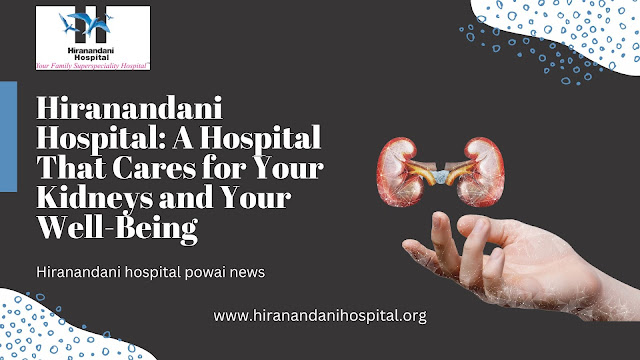What factors can result in kidney disease and how to avoid it?
Introduction
Kidney disease, also known as renal disease, is a medical condition that occurs when the kidneys are unable to function properly. The kidneys are vital organs that are responsible for filtering waste products from the blood and excreting them from the body. Kidney disease can occur due to a variety of factors, including underlying health conditions, lifestyle habits, and genetic factors. In this article, we will discuss the various factors that can lead to kidney disease and how to avoid it.
Here are some Factors that can result in kidney disease, listed by Dr. LH Hiranandani Hospital, Powai
1. High blood pressure: High blood pressure, also known as hypertension, is a leading cause of kidney disease. The high pressure damages the small blood vessels in the kidneys and makes them less efficient at filtering waste products from the blood.
2. Diabetes: Diabetes is another leading cause of kidney disease. The high blood sugar levels associated with diabetes can damage the blood vessels in the kidneys, leading to kidney damage over time.
3. Smoking: Smoking is a major risk factor for kidney disease. It can damage the blood vessels in the kidneys, reducing blood flow and decreasing kidney function.
4. Obesity: Being overweight or obese increases the risk of developing kidney disease. Obesity can cause insulin resistance and high blood pressure, both of which can damage the kidneys.
5. Family history: Genetics also play a role in the development of kidney disease. If there is a family history of kidney disease, the risk of developing the condition is higher.
6. Age: As people age, the kidneys may become less efficient at filtering waste products from the blood, increasing the risk of kidney disease.
How to avoid kidney disease?
Dr. Sujit Chatterjee, CEO, Hiranandani Hospital Kidney Transplant shared few insights on how a person can avoid kidney related disease :
1. Manage blood pressure: Keeping blood pressure under control is one of the most important steps to prevent kidney disease. Regular monitoring and management of high blood pressure can reduce the risk of kidney damage.
2. Control blood sugar: If you have diabetes, keeping blood sugar levels under control is crucial to preventing kidney disease. Regular monitoring, medication, and lifestyle changes can help manage blood sugar levels.
3. Quit smoking: Quitting smoking can reduce the risk of kidney disease and other related health problems. If you need help quitting, talk to your doctor or a smoking cessation specialist.
4. Maintain a healthy weight: Maintaining a healthy weight through diet and exercise can help prevent kidney disease. Avoiding processed foods, sugary drinks, and high-fat foods can reduce the risk of obesity-related health problems.
5. Stay hydrated: Drinking plenty of water can help prevent kidney disease by flushing out waste products from the body. Aim to drink at least 8-10 glasses of water per day.
Conclusion
Kidney disease is a serious medical condition that can have severe consequences if left untreated. Managing underlying health conditions, such as high blood pressure and diabetes, can reduce the risk of kidney disease. Making healthy lifestyle choices, such as quitting smoking, maintaining a healthy weight, and staying hydrated, can also help prevent kidney disease. If you have any concerns about your kidney health, talk to your doctor about screening and monitoring for kidney disease or visit a reliable hospital like Dr. LH Hiranandani Hospital kidney care department.



Comments
Post a Comment